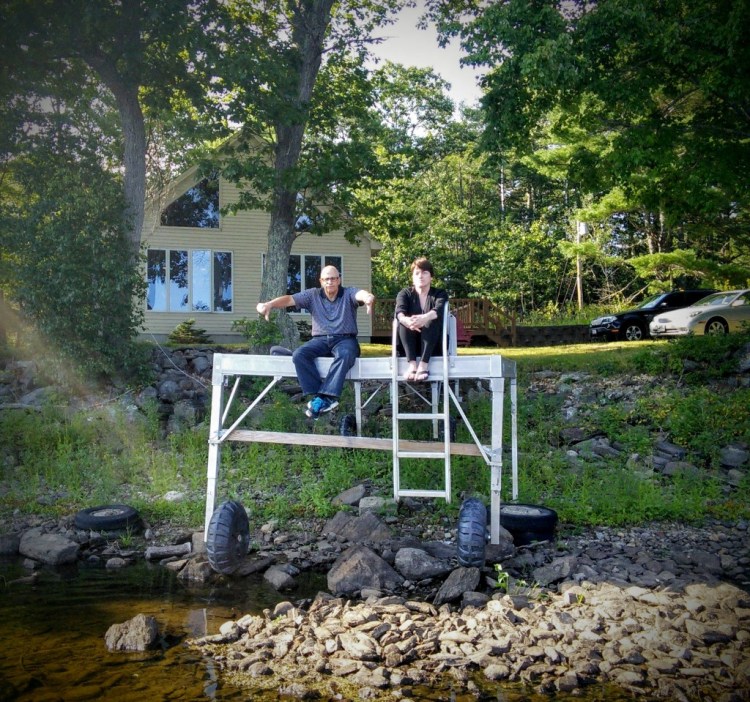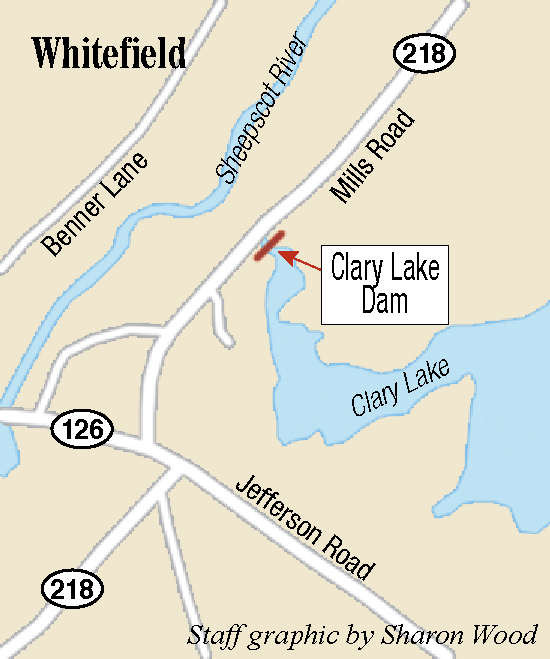A little more than three years after Robert Rubin and Cheryl Ayer said the persistent lowered level of Clary Lake damaged the value of their property in Whitefield, a Lincoln County Superior Court judge agreed — but said the defendants remaining in the case were not responsible.
The recent decision by Justice Daniel Billings marks an end to a dispute that has paralleled a long-running controversy over the management of the lake in northern Lincoln County. And because of sanctions ordered against the defendants in the course of this case, no costs were awarded to any party.
While disputes over the water level in the lake have been aired for years, property owners around Clary Lake have complained about the low water levels since 2011 that have left their docks far from the water’s edge and reduced their beaches to mud and grass.
When Rubin and Ayer, both attorneys, filed suit to recover damages, they named Paul Kelley and his company, Pleasant Pond Mill LLC, and Richard Smith and his company, AquaFortis Associates LLC, as defendants.
Kelley had claimed that Tropical Storm Irene, which struck in 2011, damaged the dam.
At that time, Pleasant Pond Mill owned the dam. But since then, Kelley filed for bankruptcy protection on behalf of both his company and himself, and by the time of the December 2018 trial, they were not part of the case.
The Clary Lake Association, which purchased the dam from the bankruptcy estate of Kelley, did not take part in the lawsuit. Instead, it has pursued enforcement of the water level order that the state Department of Environmental Protection imposed on Kelley and Pleasant Pond Mill in 2014 as the result of a petition by property owners on Clary Lake.
That left Smith and AquaFortis Associates, which owns property adjacent to the dam and a building that sits on top of the dam, to answer the claims.
During testimony in the two-day bench trial in December 2018, Rubin argued that the two LLCs were closely connected and that AquaFortis Associates was effectively an alter-ego of Pleasant Pond Mill.
In his decision, Billings wrote that Rubin and Ayer were able to show that the value of their property had decreased since 2011 but that Smith and AquaFortis Associates were not responsible.
“If PPM were still a defendant in this action, the court would have no difficulty entering a judgment for $50,000 in compensatory damages and moving on to determine if any amount of punitive damages would be appropriate,” Billings wrote.
But, Billings wrote, the evidence presented at trial — including instances when Smith and Kelley were both named on a checking account and apparently shared an address at a home in Camden, and a letter on AquaFortis stationery signed by Kelley, among other things — did not convince the court that the two businesses should be treated as one entity.
“Though the interests and activities of the two LLCs have often been aligned and overlapping, these actions are not so pervasive that they formed one enterprise,” he wrote. “It is clear from the evidence that by 2010, the grand plans for redevelopment of the properties was at a standstill. However, in 2010, the dam had not failed, so the court does not reach the conclusion that the reorganization was intended to shield the possibly valuable real estate from the liabilities associated with the dam.”
Billings wrote that it would not be equitable to hold Smith liable for the damages caused by a dam he did not own or control.
“The most troubling evidence the court heard in this case is that the dam in question has been repaired, after a seven-year delay and protracted litigation, at a cost of only $30,000,” he wrote. “It is tragic that the time and effort that was spent on an unsuccessful fight against the DEP Water Level Order was not instead focused on finding resources to repair the dam.”
While the judgment was entered for Smith and his company, Billings said because of sanctions imposed on Smith and his company in 2017 by the court, no costs would be awarded to any party.
Those sanctions were listed in an order that dates back to August 2017. Smith and his company were prohibited from seeking discovery, filing any additional motions and from presenting any witnesses or testimony at the trial or at any evidentiary hearing, although witnesses brought by Rubin and Ayer could be cross-examined. The reason was their failure to comply with their obligations to provide information and comply with orders of the court.
Initially, Smith and his company were not represented by an attorney, but Dennis Carrillo represented them at trial. Carrillo did not immediately return a call Wednesday.
Rubin, reached Wednesday, said he has no plans to file an appeal. Wednesday was the final day to file and appeal.
Jessica Lowell — 621-5632
jlowell@centralmaine.com
Twitter: @JLowellKJ
Send questions/comments to the editors.




Comments are no longer available on this story